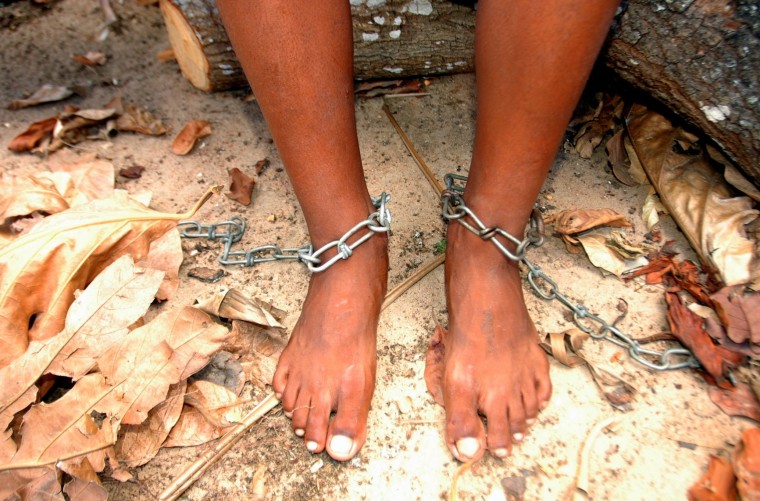
The question leapt at me from the blog page I was reading.
Why indeed? Why in our so-called modern, enlightened world, with its strong emphasis on human rights (in the Western world anyway) is slavery still a thing – and a big thing too. Slavery is big business, even though technically it was abolished centuries ago. It’s there in the plight of bonded labourers in Pakistan; it’s clearly evident in sex trafficking and brothels in Asia. Closer to home, it’s apparent in NZ when immigrant labourers are kept in sub-standard conditions, trapped by the visa that ties them to a job that is using them as sweated labour, with little payment. (They can’t return to their home country because their employer has kept their passports, and besides, the family back home may be relying on some of their meagre income.)
Why do we treat other human beings in these ways?
Here are some responses to this question:
- The system allows it to happen. When we allow the conditions that encourage exploitation, then it is bound to happen. Systemic change is often needed to change these conditions. And when laws are broken, hefty penalties need to be enforced. It’s encouraging when unscrupulous landlords or employers are charged and brought to court. Lax laws and lax enforcement encourage corruption.
- Poverty makes people desperate. In poorer countries, some parents feel they have no choice but to sell off their daughters in order to feed their remaining children. Or, someone arrives in the village promising jobs in the city, and young girls are deceived into leaving home, only to find there is no job, only a life as a prostitute. They can’t return home, because of the shame they will bring on the family. They are trapped. Or, young people leave home and go to another country in order to earn money to support their family back home, where there aren’t sufficient employment opportunities. Then they end up being exploited.
- Human greed leads to the exploitation of others. This is at the core of why some human beings become slaves. There are always people who are out to use other people for their own purposes, usually to make money. It derives from a mindset that sees other people as expendable, as not being worthy. It’s at the heart of prostitution, bonded labour, exploited workers, rapacious landlords.
Our unequal society
We may not exploit others through these forms of slavery, but if we look more closely, then we can see our world is very unequal – we have the haves and have-nots, the pecking order (just ask who does the menial jobs in a country to find out who are the exploited ones), and when a mix of racism, misogyny, ableism, ageism and disadvantaged young people or elderly are all added, we have a society that is characterised by inequality of various kinds, even if the worst forms are unlawful.
Our philosophy of life regarding others
How we see other people comes down to our basic philosophy of life. And although most Western societies still carry something of the Christian ethos, as expressed in an emphasis on human rights, the practice of that ethos has become uneven. Yes, we have laws that don’t allow for discrimination on grounds of sex, age, religious belief, etc, but we also have pockets of society that don’t see others as of equal value to themselves. The employers who exploit workers; the far-right extremists who want white supremacy and who see immigrants and those of a different colour as of lesser value, the misogynist red-necks who can’t accept a woman in authority, (remember the older man at the parliamentary occupation who said he wasn’t going to listen to ‘a young girl in a skirt’?)
Who doesn’t discriminate?
Discrimination is part of our human nature. It’s evident in the school grounds where there is an ‘in’ group, and where a child is bullied because he/she is different in some way. It’s there in the way a teacher will prefer some students to others. It’s only a small step from that kind of behaviour to seeing others as not equal to ourselves.
If we don’t believe in a Maker, then we won’t see others as being equal to us. Belief in a God who created us is the foundation on which our equality rests. Without that, we will never have an equal society. We may legalise against slavery, but we can’t abolish ingrained attitudes. We can try in the classroom to teach and demonstrate the value of all human beings, (and we should) only to hear the put-downs in the playground. Most adults will pay lip-service to the idea of human equality, but scratch beneath the surface, and we all have unspoken, unconscious biases against particular groups of people or individuals.
Walking ‘humbly with our God’
Recently, I became aware of the death of a man who had been a well-known sportsman in his youth, but the most important thing in his life was character. He had lived his life based on the words found in Micah – that we are called “to do justly, to love mercy, and to walk humbly with our God.” If we live like that, then it will follow on that we will learn to regard and treat others in the way Jesus told us to – to do to others, what we would want done to us.

Liz Hay rejoices in living in a beautiful part of God’s creation in a high country mountain basin; and she also rejoices in hearing stories of God at work in people’s lives. One of her favourite activities is reading fascinating biographies that illustrate the wonderful ways God works uniquely with each person.